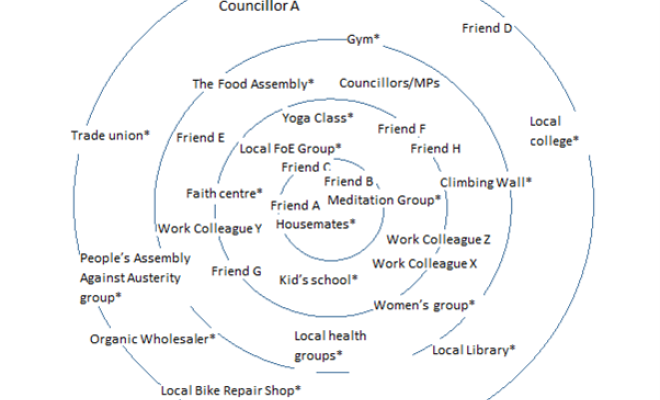03 Dec 2025
Campaigning often involves working closely with your MP, council members or other elected representatives. That's known as lobbying and there are a few ways you can go about it.
You can try:
- Talking to people with the power to make decisions.
- Giving them information on an issue or campaign.
- Letting them know where your group stands on a topic and why.
- Persuading elected representatives to make change happen.
Elected representatives want to hear from people like you. As their constituents, they represent you, so they’ll want to know what’s troubling you. Keep them up to date with the issues that concern you, and let them know whether you think they’re doing a good job or not. With a bit of effort, they’ll take on your campaign.
Read on to find out how to lobby decision-makers, and check out our video webinar on the "A to Z of MP lobbing".
Getting started: who should you speak to?
It isn’t always clear who has the power to make the changes you want. If in doubt, check out your local authority website, give them a call or check out our guide on understanding how your council works.
Once you’ve found your target, you need to think about the following:
- What can that person do?
- Where do they stand on the issue?
- What are they realistically going to do?
- What’s stopping them?
- Can other people or groups help?
- What are you going to ask them to do? Just telling them what you think won’t change anything – ask for something specific.
- Who else do you need to talk to?
While the focus of your lobbying might be your elected representatives, you may also need to work with other people.
At a local level, this could include council officers, your MP’s constituency office staff, other community groups, organisations and businesses.
Importantly, the more diverse the people you work with and the group you lobby with, the more successful you’ll be.
Useful links
5 ways to lobby
Now that you’ve found who you want to lobby and learned more about them, it’s time to begin. Think about what would work best for your area or your council. You’ll probably need to use a combination of the methods below.
You might not see eye-to-eye with the person you’re lobbying, but it’s a good idea to build a positive relationship if possible. People respond better if there is mutual respect, so remember that when you’re dealing with them.
The bigger and more diverse your group, the more likely it is that decision-makers will pay attention and support your cause.
1. Write a letter
- A personal, hand-written letter can be very effective.
- Keep your letter short and to the point.
- Personalise your letter with your thoughts or relevant anecdotes as well as any statistics.
- Keep it local. Think about what’s possible in your area.
- Don’t assume that they know the issues, so explain it in simple terms.
- The way you write is almost as important as how you write. That doesn’t mean you need to use fancy words, but be polite. Don’t exaggerate or be self-righteous, as that can get people’s backs up.
- Get others to write as well. The more people they hear from, the more likely they are to act.
- Include your name and address so they can reply.
2. Send an email
Emails are quick and easy, but local representatives get a lot of them. To stand out, try and make yours as personal as possible.
Keep in mind all the tips that we mentioned for writing a letter.
If you don’t get a reply. it can be worth a follow-up phone call a few days later. Try to get them to say how long you should wait for a response. That way, you can hold them to it and contact them again if they miss the agreed deadline.
3. Make a phone call
Sometimes the best way to be heard is to speak directly to your local representative. It can be daunting though, so here are some tips:
- Always be clear and polite.
- Start with ‘How are you?’ and don’t jump straight into your concerns. Speak to them like you would a colleague.
- Explain why you’re calling, what your concerns are and what you would like to happen. Remember, you can be both a concerned local resident and a member of a climate action group.
- Be prepared to leave them a message if they’re busy when you call.
- You may not get to say everything you want to say. Your representative might interrupt you to say that they can’t comment on this issue. They might try to point you to someone else or ask you to send an email instead. If this happens, say you’ll send an email setting out your points.
It’s always a good idea to send a follow-up email anyway, summing up any next steps that were agreed.
Top tip: try writing a script for what you want to say in advance!
Make sure it includes:
- Who you are and where you live.
- What you are calling about.
- Your particular concerns.
- Personal stories that link you with the campaign.
- What you would like them to do.
- An offer to provide further information by email.
4. Use social media
Twitter or Facebook can be a great way to reach out to your representative. Just remember that what you and your elected representative write will be public – which can be good for getting attention to the cause. But don’t be a troll.
- Stay professional – avoid swearing or personal attacks.
- Think about using photos to making posts that stand out.
- Don’t spread fake news, so fact check before sending.
- Avoid lobbying on too many issues at once.
- Jump on a hashtag such as #TakeClimateAction to spread your message.
- Don’t spam your representative. Tagging them once or twice on an issue should be enough.
- Except...at key moments such as in the lead-up to an important vote! Then you can tweet them once or twice a day.
- Get friends and family to like and share your posts.
Check out our guide to using social media.
5. Meet in person
Elected representatives hold regular drop-in sessions for the people they represent. You can also ask to meet them at other times too – this is your right.
You’ll usually get a 10-15-minute slot so plan ahead to get the most from your meeting.
Beforehand
- Decide what you want from the meeting. Do you want your elected representative to make a statement, attend a meeting or something else?
- Meetings are normally quite short, so focus on up to 3 key messages. Find facts and statistics to back up your points.
- Don’t worry about not being an expert. You have a right to get your points across. Plus, you’ll often know far more than the person you are lobbying.
- Decide whether you’ll go by yourself or as a group.
During
- The way you present your message is almost as important as what you’re saying. Think about your body language and your appearance. Be confident, but stay calm and respectful.
- Ask them to do something specific.
- Give them a reason to act. What’s in it for them if they do? What’s waiting for them if they don’t?
- Keep to your agenda – don’t let them talk around the issue while saying nothing.
- Don’t be afraid to ask again whether they will support your issue if they haven’t answered the question.
- If they’re still not committing, ask if there is any other information you can give them that would help.
- Offer to send further information. Take brief notes on what the person you are lobbying is saying. Keep a record of anything they agreed.
- Take along any briefing documents you feel is suitable to hand over.
Afterwards
- Get in touch to thank your elected representative for seeing you.
- If there were any next steps agreed, write to remind everyone what they were.
- Get in touch with the local newspaper, TV, or radio station to see if they're interested in this as a story. If your elected representative has agreed or refused to do something, this may be a hook. Tweet about the meeting – if they're supportive, they might be willing to take a photo with you for this. Use your campaign hashtag and see our guide to attracting media attention.
- Keep up the conversation. Let your elected representative know the latest developments and invite them to any relevant events
- If you don't get the response you want, be persistent. Encourage others to organise face-to-face meetings.
Meeting as a group
Elected representatives will prioritise talking to and meeting people from their ward, constituency or region. If you’re going along as a group, then you’ll need at least one person from the area they represent.
- Get together beforehand and decide what part of the issue each of you will talk about.
- It’s often a good idea to have one person just sitting back and making notes about the conversation. They might step in if the conversation goes off-topic or gets a little too heated. Decide who will play this role.
- If you are a group, don't disagree with each other at as it takes away from the message.
- Are there others you could bring to show that you represent local opinion? Think about heads of local clubs or groups. Think about whether you are representing the diversity of your local community in terms of age, gender, ethnicity, and religion.



